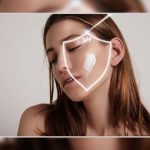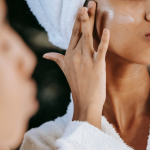Dark circles, or periorbital dark circles, are a common cosmetic concern affecting the delicate skin around the eyes. They appear as dark, discolored areas under the eyes and can give the impression of tiredness, stress, or aging. While generally not a serious medical condition, dark circles can significantly impact one's appearance and self-confidence.
These circles can manifest in shades of blue, purple, or brown, and their appearance may be influenced by genetics, lifestyle, and underlying health issues. Dark circles can be caused by a combination of factors, including:
1. Thin Skin: The skin around the eyes is thinner than in other areas of the body, making blood vessels and underlying structures more visible and contributing to the appearance of dark circles.
2. Blood Vessel Congestion: Dilated blood vessels beneath the eyes can lead to a bluish or purple tint, especially if the blood vessels are close to the skin's surface.
3. Pigmentation: Excessive melanin production in the skin under the eyes can lead to brownish discoloration.
4. Genetics: Family history and genetics can play a significant role in the likelihood of developing dark circles.
5. Lifestyle Factors: Lack of sleep, chronic fatigue, stress, poor nutrition, dehydration, and excessive sun exposure can all contribute to developing dark circles.
6. Aging: As we age, the skin's collagen and elastin fibers may weaken, causing the skin to become thinner and more prone to the appearance of dark circles.
7. Allergies and Nasal Congestion: Allergies can lead to congestion of blood vessels and promote the development of dark circles.
8. Medical Conditions: Certain medical conditions, such as eczema and thyroid disorders, can contribute to forming dark circles.
Addressing dark circles often involves a combination of lifestyle changes, skincare routines, and, in some cases, medical treatments. Some strategies for managing or reducing the appearance of dark circles include:
– Adequate Sleep: Getting enough quality sleep can help reduce the appearance of tiredness and improve the skin's condition.
– Healthy Diet: Consuming a balanced diet rich in nutrients and staying hydrated can support skin health.
– Skincare: Using moisturizers, eye creams, and products containing ingredients like vitamin C, retinol, and hyaluronic acid can improve the appearance of the under-eye area.
– Sun Protection: Wearing sunscreen and sunglasses can help prevent sun-induced damage that can contribute to dark circles.
– Allergy Management: Addressing allergies and avoiding triggers can reduce nasal congestion and dark circles.
– Cosmetic Treatments: In some cases, medical procedures like chemical peels, dermal fillers, or laser therapy may be recommended to improve the appearance of dark circles.
It's important to note that while various products and treatments can help reduce the appearance of dark circles, complete elimination may not always be possible, especially if the cause is genetic. If dark circles concern you, consulting a dermatologist or healthcare professional can provide personalized recommendations and guidance on the most appropriate approaches for your situation.
7 Premium Eye Creams Which Help To Remove Dark Circles
While we can provide the names of popular and well-regarded premium eye creams often recommended for addressing dark circles, please remember that individual results can vary. It's important to choose products that suit your skin type and preferences. Here are seven premium eye creams known for their potential to help reduce the appearance of dark circles:
1. La Mer The Eye Concentrate: This luxurious eye cream is formulated with La Mer's signature Miracle Broth™ and marine extracts to help reduce the look of dark circles and improve the appearance of under-eye puffiness.
2. Skinceuticals A.G.E. Eye Complex: Skinceuticals offers this eye cream to address the signs of aging around the eyes, including dark circles. It contains ingredients like proxylane, blueberry extract, and peptides.
3. Estée Lauder Advanced Night Repair Eye Supercharged Complex: Part of Estée Lauder's Advanced Night Repair line, this eye cream is designed to target multiple signs of eye aging, including dark circles, puffiness, and fine lines.
4. Shiseido Benefiance Wrinkle Smoothing Eye Cream: Shiseido's Benefiance line is known for its anti-aging properties. This eye cream aims to improve the appearance of wrinkles, fine lines, and dark circles.
5. Sunday Riley Auto Correct Brightening and Depuffing Eye Cream: Formulated with caffeine, peptides, and antioxidants, this eye cream from Sunday Riley is designed to brighten the under-eye area and reduce puffiness and dark circles.
6. Drunk Elephant C-Tango™ Multivitamin Eye Cream: This eye cream from Drunk Elephant contains a blend of antioxidants, ceramides, and vitamin C to improve the appearance of dark circles and provide hydration.
7. Tatcha The Pearl Tinted Eye Illuminating Treatment: Tatcha's eye treatment combines skincare with a touch of tint for an immediate brightening effect. It includes pearl pigments, niacinamide, and botanical extracts to address dark circles.
Remember, when choosing an eye cream, it's important to consider your specific skin concerns.
These ingredients work well for your skin type, any allergies or sensitivities you may have, and your overall skincare routine. It's also a good idea to perform a patch test before applying any new product to your delicate eye area. If you're unsure which product is best for you, consulting with a dermatologist or skincare professional can provide personalized recommendations tailored to your needs.
Which Factors Help Eye Cream For Dark Circles To Work
The effectiveness of an eye cream for dark circles can be influenced by several factors. While individual responses may vary, here are some key factors that can contribute to the success of eye creams in addressing dark circles:
1. Ingredients: Look for eye creams with ingredients that target dark circles. These may include:
- Vitamin C: Helps brighten and improve the appearance of discoloration.
- Vitamin K: Aids reduce the appearance of blood vessels and dark circles.
- Retinol or Retinoids: Promotes skin cell turnover and collagen production.
- Peptides: Can help improve skin texture and reduce pigmentation.
- Caffeine: May help reduce puffiness and improve circulation.
- Hyaluronic Acid: Provides hydration and plumps the skin.
- Niacinamide: Helps improve overall skin tone and texture.
2. Formulation: How ingredients are formulated and delivered in the eye cream matters. Ensure the product is stable and that the active ingredients can penetrate the delicate skin around the eyes.
3. Consistency: Consistently applying the eye cream as directed is essential. Results may take time to become noticeable, so patience is key.
4. Protection from UV Rays: UV radiation can worsen pigmentation and dark circles. Using sunscreen and sunglasses when outdoors can help protect the delicate skin around the eyes.
5. Proper Application: Gently tapping or massaging the eye cream onto clean skin can aid absorption and circulation. Avoid tugging or pulling on the delicate eye area.
6. Healthy Lifestyle: A balanced diet, adequate sleep, proper hydration, and stress management can all contribute to healthier-looking skin and may complement the effects of eye cream.
7. Managing Underlying Causes: If dark circles result from allergies, sinus congestion, or other health issues, addressing these underlying causes can contribute to better results from an eye cream.
8. Additional Skincare: Incorporating other targeted skincare products, such as serums and moisturizers, into your routine can enhance the overall effectiveness of your skincare regimen.
9. Regular Skincare Routine: An overall skincare routine that includes cleansing, exfoliating, and moisturizing can improve skin health and potentially enhance the effects of eye cream.
10. Individual Factors: Everyone's skin is unique, so what works for one person may not work the same way for another. Genetics, age, skin type, and the severity of dark circles can all influence how well an eye cream works.
It's important to manage expectations and remember that while eye creams can help improve the appearance of dark circles, complete elimination may not always be possible, especially if the dark circles are caused by genetic factors. If you're uncertain which products or ingredients are best for you, consider consulting a dermatologist or skincare professional for personalized guidance.









No Comment! Be the first one.